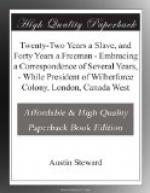But are we alone shut out and excluded from any share in the administration of government? Are not the clergy, a class of men equally ineligible to office? A class of men almost idolized by their countrymen, ineligible to office! And are we alone excluded from what the world chooses to denominate polite society? And are not a vast majority of the polar race excluded? I know not why, but mankind of every age, nation, and complexion have had lower classes; and, as a distinction, they have chosen to arrange themselves in the grand spectacle of human life, like seats in a theater—rank above rank, with intervals between them. But if any suppose that happiness or contentment is confined to any single class, or that the high or more splendid order possesses any substantial advantage in those respects over their more lowly brethren, they must be wholly ignorant of all rational enjoyment. For what though the more humble orders cannot mingle with the higher on terms of equality. This, if rightly considered, is not a curse but a blessing. Look around you, my friends: what rational enjoyment is not within your reach? Your homes are in the noblest country in the world, and all of that country which your real happiness requires, may at any time be yours. Your industry can purchase it; and its righteous laws will secure you in its possession. But, to what, my friends, do you owe all these blessings? Let not the truth be concealed. You owe them to that curse, that bitter scourge of Africa, whose partial abolishment you are this day convened to celebrate. Slavery has been your curse, but it shall become your rejoicing. Like the people of God in Egypt, you have been afflicted; but like them too, you have been redeemed. You are henceforth free as the mountain




